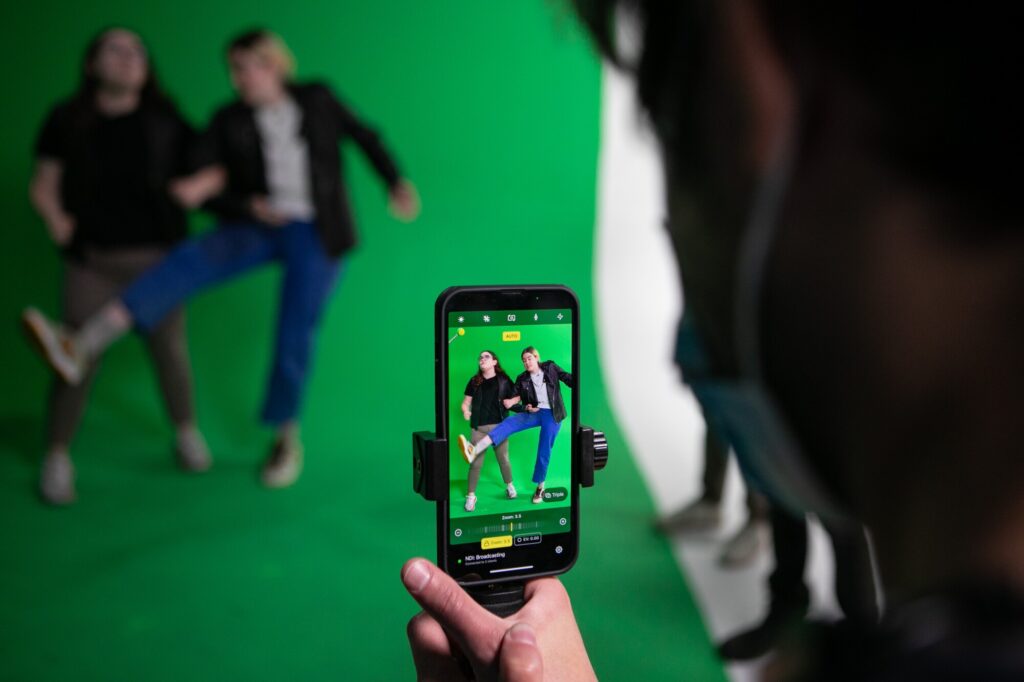With minutes to go before the premiere of “Stapleview’s” second episode, the set of the sketch comedy show is abuzz with the unmistakable energy of a live production barreling rapidly toward showtime.
But amid all the commotion — as crew members rush to set up script monitors and hand out last-minute props — the cast has its focus turned elsewhere.
The actors are on their phones, using TikTok.
Sarah Coffey (228,000 followers) is live-streaming a Nicole Kidman impression as she wanders the studio. “We come here to laugh; to cry,” she proclaims into her camera. “Somehow, heartbreak feels good in a place like this.”
A few yards away, Dylan Adler (18,000 followers) is on the app, too, doing his own bit: an astrology-obsessed Lin-Manuel Miranda. “Tell me your sign in the comments,” he urges his followers before freestyling a staccato list of horoscopes.
Every corner of the building seems to have a different cast member filming themselves. Near the stage, viewers watch Gray Fagan (4.4 million followers) get miked up. In the writers room, Grace Reiter (1.7 million followers) dances to “Save a Horse (Ride a Cowboy).” On the floor of the costume closet, Jane Wickline (832,000 followers) sits cross-legged, chatting softly with her fans.
“We’re going live tonight!” DaMya Gurley (350,000 followers) exclaims to an online audience several hundred strong. “It doesn’t get any better than this.”
Only Sydney Battle isn’t spending these last few moments on TikTok; she’s more of a Twitter comic, herself (64,000 followers).
A knack for being funny online landed all seven cast members their spots in the “Stapleview” lineup. The show — so named because its studio is tucked behind a Staples in Atwater Village — is not only staffed mostly with TikTokers but also broadcasts exclusively on the platform, and leans into both the visual language and comedic sensibilities of what’s now been the most downloaded social network in the world for two years running.
Because “Stapleview” shoots vertically, framing each shot is a delicate dance that requires preparation and forethought.
(Jason Armond / Los Angeles Times)
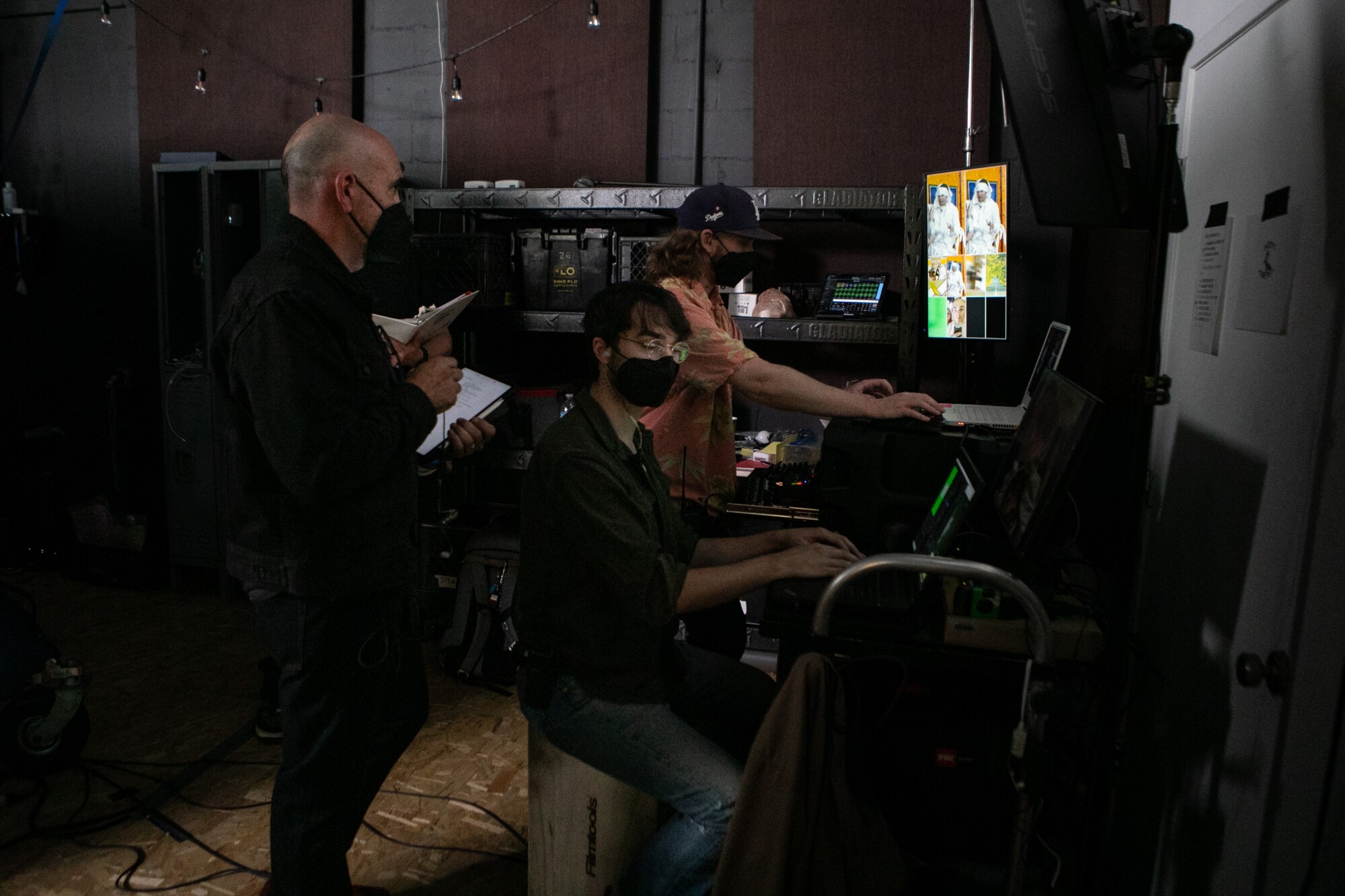
Crew members work in the control room backstage.
(Jason Armond / Los Angeles Times)
A sort of Gen Z answer to “Saturday Night Live,” “Stapleview” launched in early March with plans to write, stage and perform five episodes of live sketch comedy over the course of five weeks. With off-screen talent culled from some of the biggest sketch series of the last decade, and on-screen stars who’ve mostly made a name for themselves by being really good at the internet, it’s a convergence of Hollywood insiders and digital creators that shows how both industries are evolving the way they develop new talent.
It also represents a bet that young people who grew up expecting bingeable episode dumps and bottomless news feeds are still willing to tune in to a specific program, at a specific time, once a week, every week — just like their parents used to do.
That’s all very abstract, though. Right now, people are focused on amping themselves up for the sophomore episode’s 6 p.m. start time, and the cast has begun directing its live-stream viewers toward the @stapleview account, where the impending broadcast is about to air.
“Let’s get to our places,” one stagehand says.
“Two-minute warning,” another alerts the team.
For Sam Grey, the creator of the whole undertaking, these final moments mark the crescendo of not just a week’s worth of prep, but also many months spent shepherding the project from dream to reality.
Grey is no newcomer to the world of comedy. He was previously a producer at Broadway Video, the studio founded by “SNL” creator Lorne Michaels, and has also worked as a talent manager. His father, Brad Grey, was once Paramount’s chief executive.
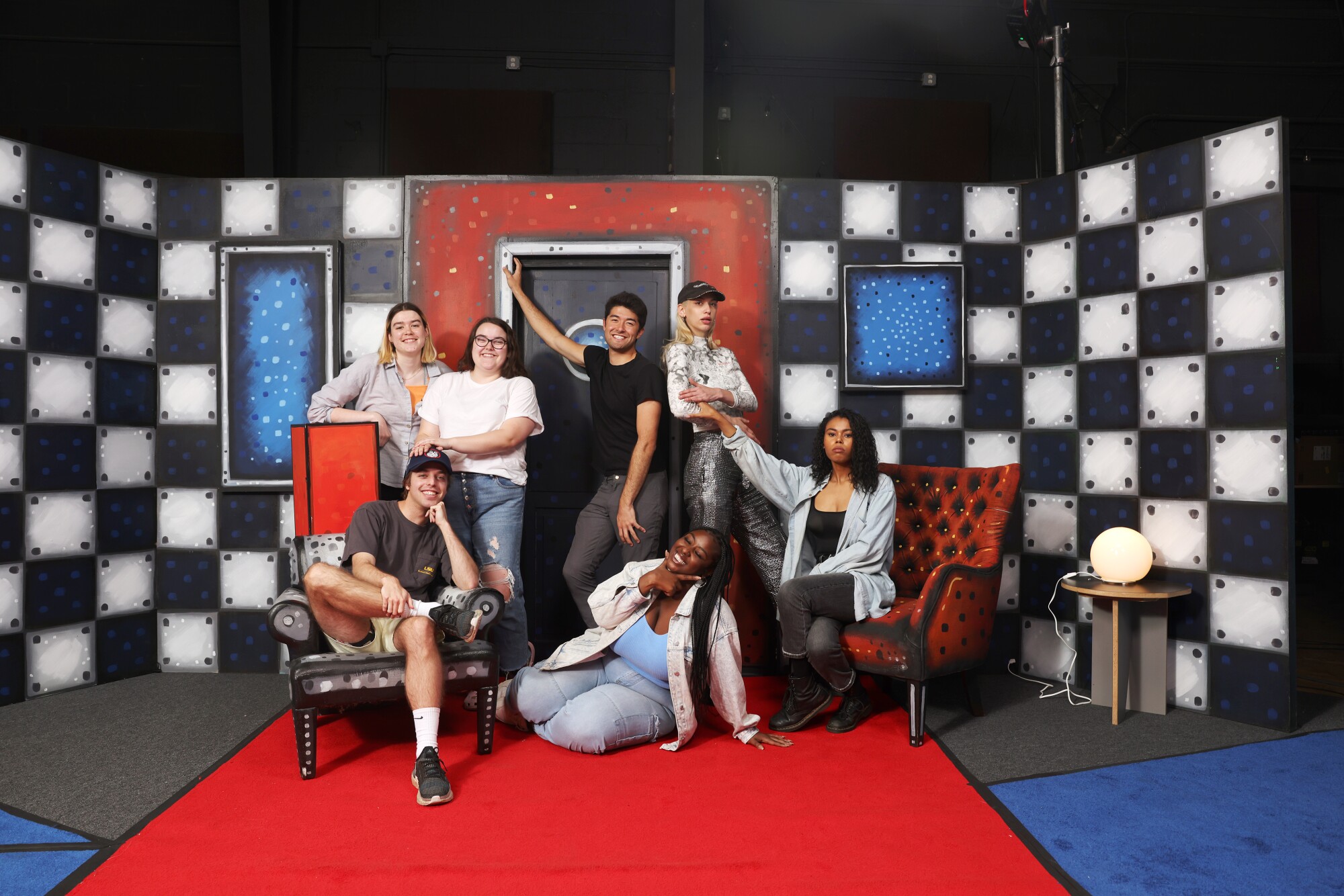
“Stapleview” films episodes in a mixed-use Atwater Village studio space, broadcasting them live over TikTok’s streaming service.
(Dania Maxwell / Los Angeles Times)
But the project that would eventually become “Stapleview” didn’t snap into focus until about two years ago, when Grey downloaded TikTok for the first time. Like so many others at the start of the pandemic, he became enamored with the app’s algorithmically curated feed of videos — many of which, for him, ended up being comedy sketches.
“Everybody here, I saw on TikTok,” he said of the “Stapleview” cast. “I feel like it is the place to find the next generation of comedians and funny people, so I’m trying to harness that energy and put it all into this.”
The idea to develop comedy programming native to the platform evolved from there. Grey said he considers “SNL” “the greatest thing in TV history,” and old late-night shows are his “first love,” so the plan was less to rethink variety shows than to adapt them for a new medium. Or, as Grey puts it: approach an old format “in a new — not more vibrant — a new, vibrant way.” (The decision to air the show in early evening instead of late night was made based on data showing when its intended viewers are on TikTok, Grey said.)
He began putting together his off-screen team last July, drawing on a mix of old co-workers, friends of friends, clients from his management days and his own brother to flesh out the writing and production staff. Those hires’ past credits read like a highlights reel of recent sketch comedy hits, including “The Eric Andre Show,” “I Think You Should Leave” and “Comedy Bang! Bang!”
By August, Grey had also started reaching out to the TikTokers he wanted to cast, tracking them down via email, Instagram DMs and Zoom calls. Several agreed to move out to L.A. for the gig.
“Stapleview” isn’t the first professionally backed comedy project to use social media as a talent pipeline. In its last casting cycle, “SNL” hired James Austin Johnson, a Los Angeles comedian whose rambling Donald Trump impressions have gone repeatedly viral, and the sketch comedy group Please Don’t Destroy, the three members of which found fame on TikTok and Twitter before “SNL” scooped them up. In 2019, Adult Swim built a show around the Twitter comedian @dril, and both “Broad City” and “Insecure” have their roots in YouTube web series that mainstream networks later glommed onto.
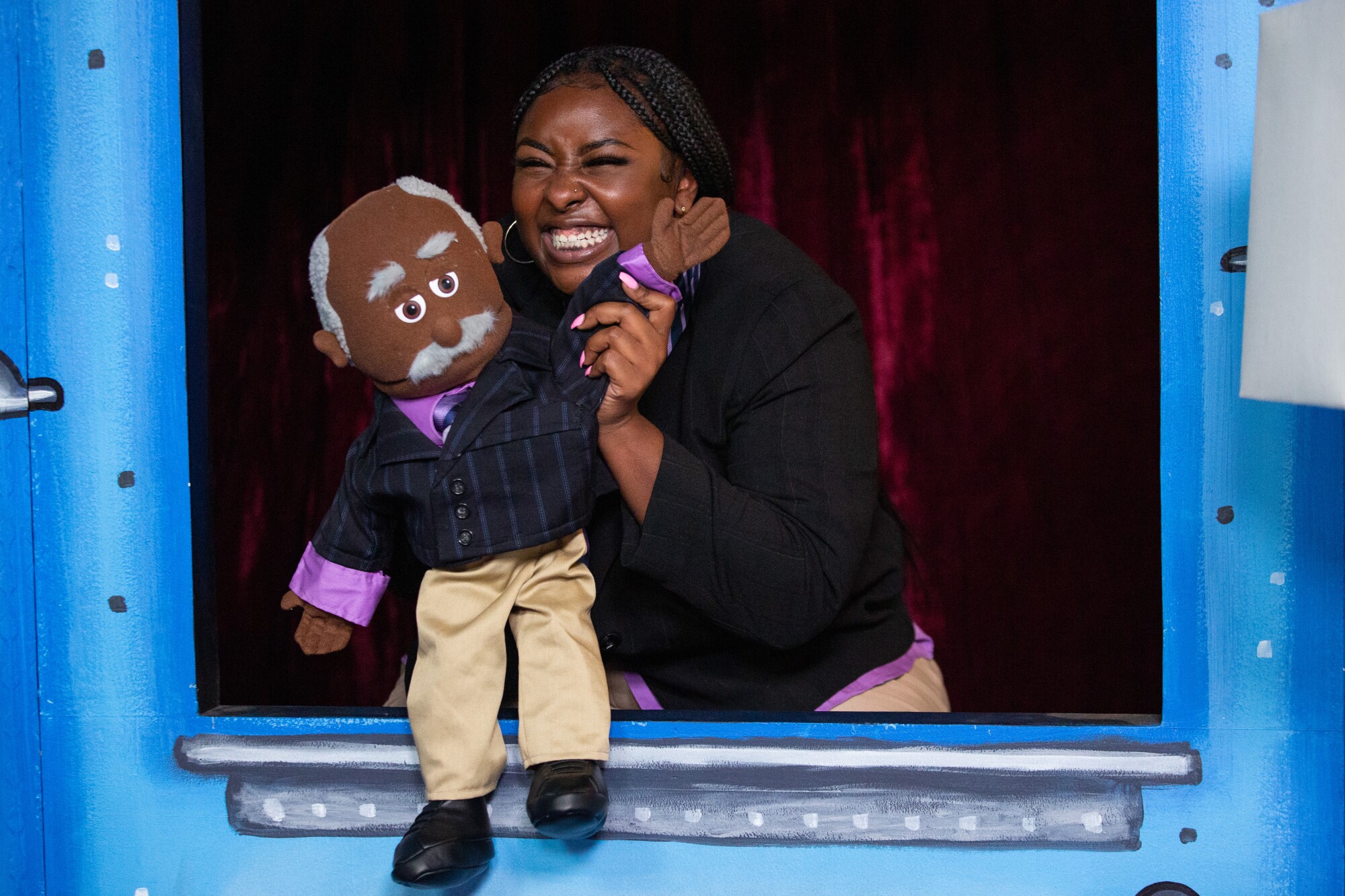
TikTok users normally watch short, snappy videos on the app at whatever time of day they want. But “Stapleview,” which broadcasts almost an hour of live comedy once a week, is betting it can get them on board with a more traditional release model too.
(Jason Armond / Los Angeles Times)
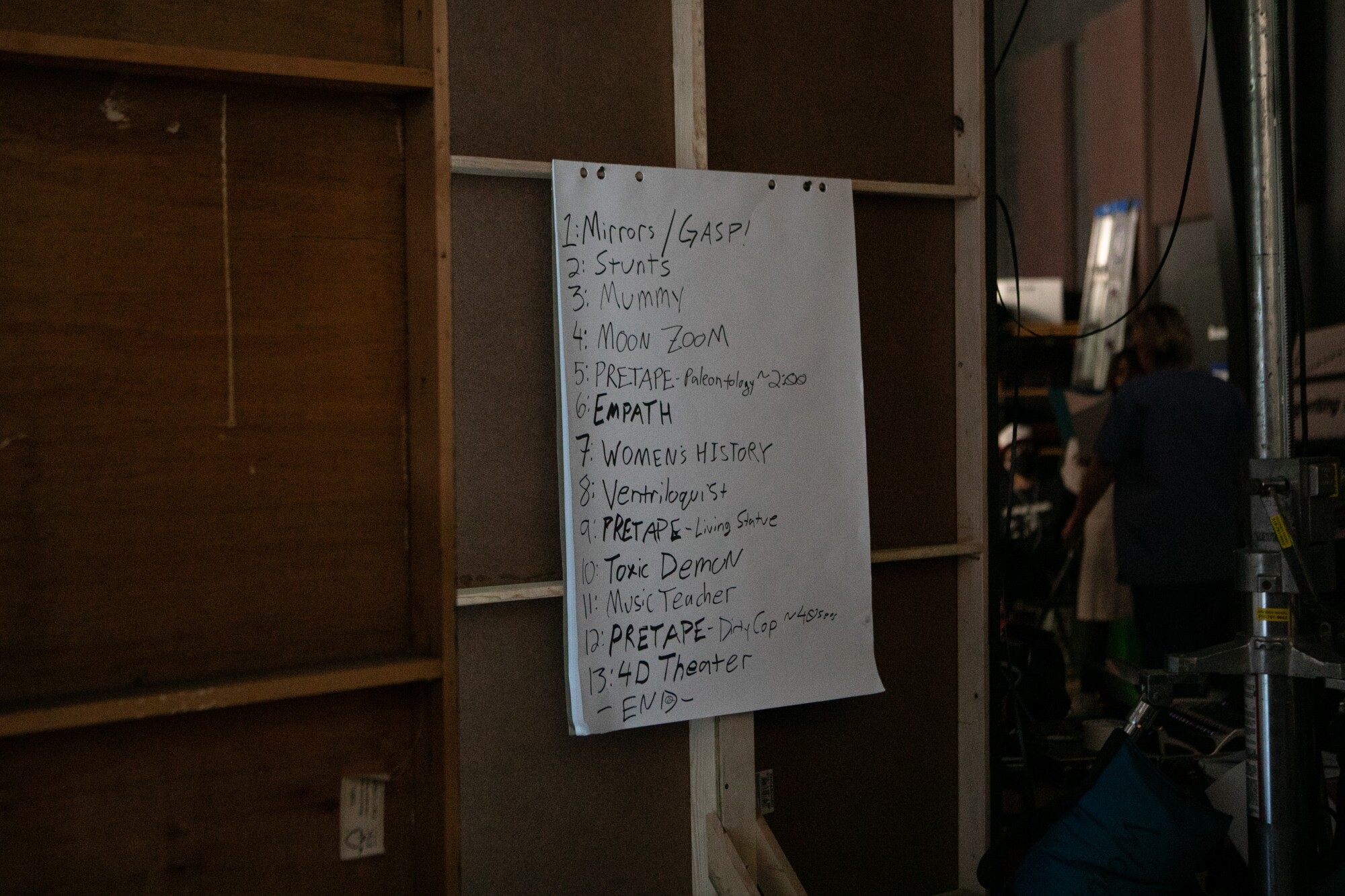
The run of the show is posted backstage.
(Jason Armond / Los Angeles Times)
That relationship works in both directions. When The Times spoke with the members of the Familia Fuego, an all-Latino TikTok comedy collective, everyone expressed interest in transitioning from social media to careers in film, television or music.
“Stapleview” is different from all those projects, however, in that it isn’t trying to bring social media creators into the fold of old-school mediums but instead meeting them where they are — on TikTok— and bringing a production team with traditional industry cred there to support them.
Grey is also introducing Hollywood-caliber resources to an otherwise very low-overhead comedy scene. He knew the show “was gonna be a low-budget or … more of an experimental vibe” from the start, using iPhone cameras and handmade props, but still approached the venture like a start-up, putting together a number of financial backers to support it.
By 2022, production on the show had begun in earnest. The team spent late January and all of February writing and pre-taping sketches to seed the “Stapleview” TikTok account with and, eventually, pepper throughout live shows. When the first full episode premiered March 3, it was at the end of a production cycle during which the team pitched, wrote, rehearsed and performed nearly an hour of original content in the span of seven days.
“We start from zero every week, usually,” Grey said.
That first episode neatly encapsulated what the team was going for: a lo-fi, frenetic string of sketches that were in conversation with, but didn’t strain too hard to replicate, TikTok’s homegrown comedy underground. Sometimes the performers acknowledged the platform that was broadcasting them; at one point, a character with a baseball for a head did a TikTok dance (it made sense in context). But other bits, such as an impression of Miley Cyrus auditioning for “Hamilton,” wouldn’t have felt out of place on something more traditional — even “SNL” itself.
The day after the premiere, the team debriefed — one big takeaway: Grey wanted more musical numbers — then dove back into the production cycle for another round. This time, The Times was invited to sit in on much of the process.
Monday is mainly spent writing scripts, plus shooting a few pre-taped sketches to post online and cut into the middle of Thursday’s show (buying the cast some much-needed time off camera to switch sets and swap out costumes). The episode really starts to take shape Tuesday morning, when 19 cast and crew members gather around a table in the writers room and read scripts written with the impending live performance in mind.
As with the first episode, some of the conceits at this table read seem honed for TikTok, including multiple jokes at the expense of empaths. Others are geared toward Grey’s call for more musical numbers, such as a song about Ruth Bader Ginsburg twerking. And some take advantage of the short turn-around that a week-by-week writing cycle allows for; one pitch, dubbed “Gasp Prices,” is a play on the rising gas prices that have recently become national news.
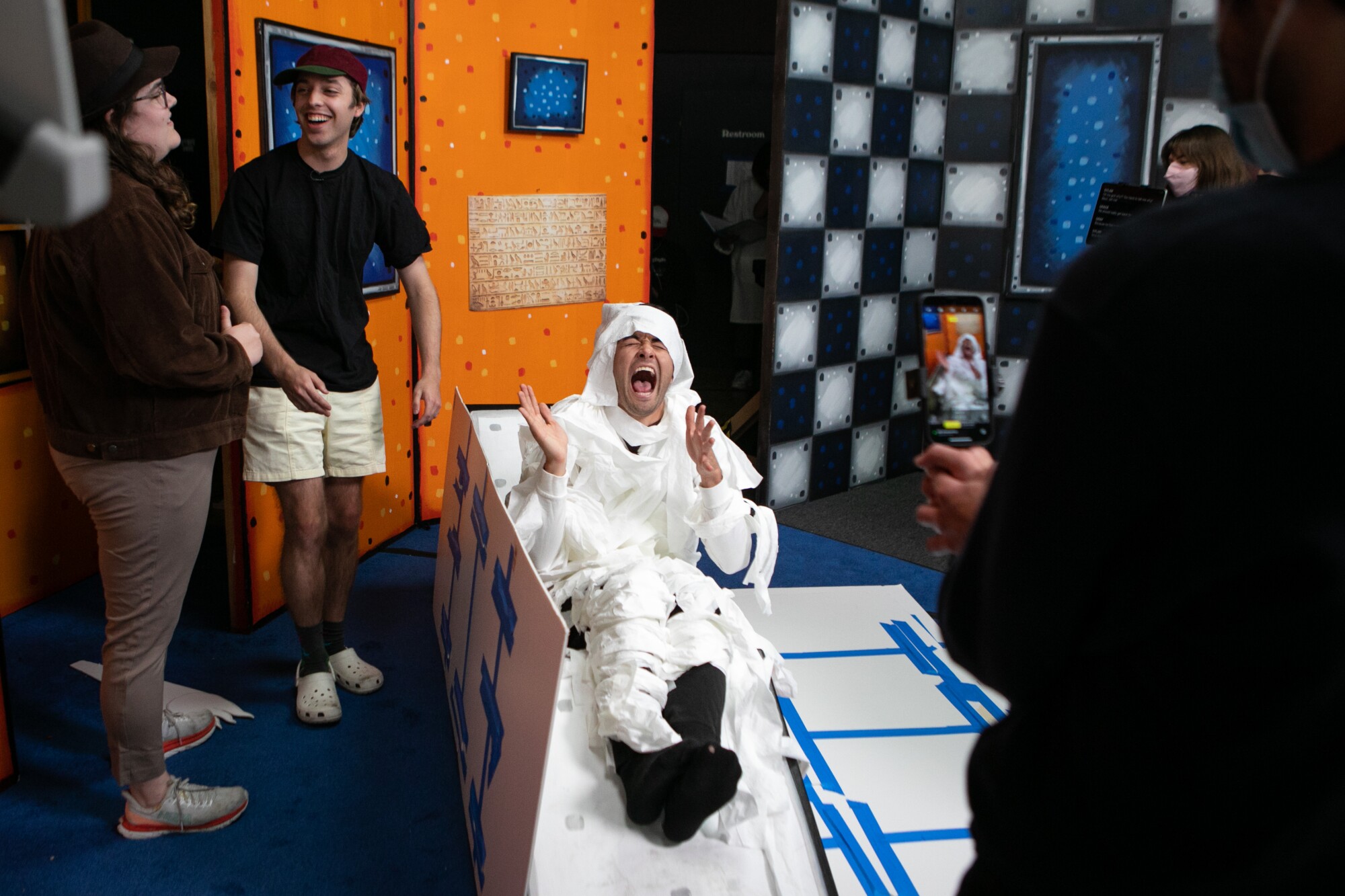
A mummified Dylan Adler rises from his coffin while performing with Grace Reiter and Gray Fagan in a “Stapleview” dress rehearsal.
(Jason Armond / Los Angeles Times)
Nearly 30 scripts later, Grey, his co-executive producer Stoney Sharp, head writer Reggie Henke and a few other staff members retreat to the dressing room to figure out which sketches should make it to air.
“I feel like I’ve seen this somewhere,” Grey worries about one pitch. “‘Scary Movie’ or something.”
“I would try to not do more than the four scripted back-to-back,” Sharp says at another point, as the team tries to figure out where to drop in the pre-tapes.
This inner circle slowly narrows their crop to 13 favorites: 11 live sketches, one correspondent piece and one pre-tape. Based on how rehearsals go, two more of the live sketches will eventually get swapped out for a second and third pre-tape.
Those rehearsals happen Wednesday: first with all 11 live sketches, then only the final nine. The cast mostly won’t be looking at scripts by showtime, Grey said, although a pair of iPads are still held at eye level during the shoot in case anyone needs a cue.
By the day of the performance, the focus is on nailing down details. The cast starts Thursday with another run-through, then does a technical rehearsal where members practice performing with TeleprompTers, microphones and cameras on set. Sharp offers some notes — “The puppet … don’t smoosh it down too much,” he tells Gurley, who’s doing a sketch about ventriloquism — before everyone takes a lunch break over catered falafel.
Then it’s straight into yet another run-through, this time to finalize where everyone needs to stand. Because the show films vertically, as is the norm on TikTok, blocking each scene is a precise process with little room for error.
“It’s shocking how quickly this turns into too wide,” Sharp warns a camera operator as they ponder how to frame Gurley’s ventriloquist.
After another brief break, the cast converges back on set for the dress rehearsal. For an “Indiana Jones” spoof, Adler wears a mummy costume made out of what looks to be toilet paper; Coffey, Wickline and Reiter all don leather jackets in a piece about an actress and her two twin stunt doubles.
By the time this final rehearsal has wrapped, there are only 45 minutes left until the show starts — which means just half an hour before the cast members are supposed to start live-streaming on their personal TikTok accounts, hopefully drumming up enthusiasm among their respective fanbases. One by one, they pull out their phones and go live.
“Welcome, everyone, to my TikTok,” Fagan tells his fans. “Hopefully all 46 of you, now, are going to watch our live show at 6.”
“You can watch us at ‘Stapleview’ on TikTok,” Reiter tells her own viewers. “You’ve probably seen two of our videos, because they went frickin’ viral.”
It’s their first time trying this lead-in strategy before an episode, and it pays off. When the live show finally starts, it takes a moment for momentum to build — but by the time the second sketch is up and running, more than 500 people are watching. That’s nothing extraordinary by TikTok standards (and viewership will drop into the mid-400s and high 300s at various points over the rest of the night), but it outpaces the first episode, which hovered at just more than 100 people for most of the run time.
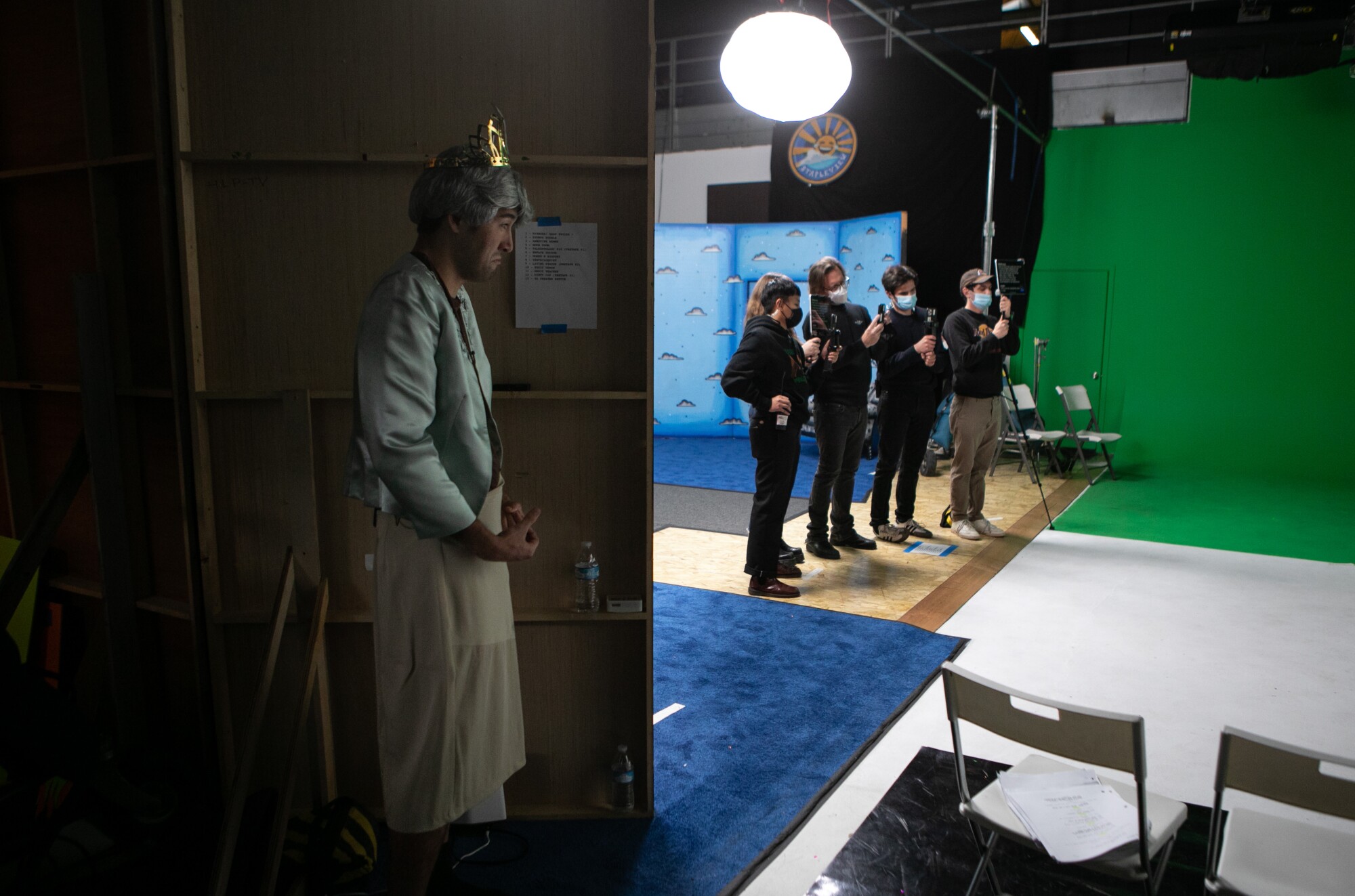
In costume as Queen Elizabeth II, Dylan Adler watches as crew members maneuver iPhone cameras and other equipment on stage.
(Jason Armond/Los Angeles Times)
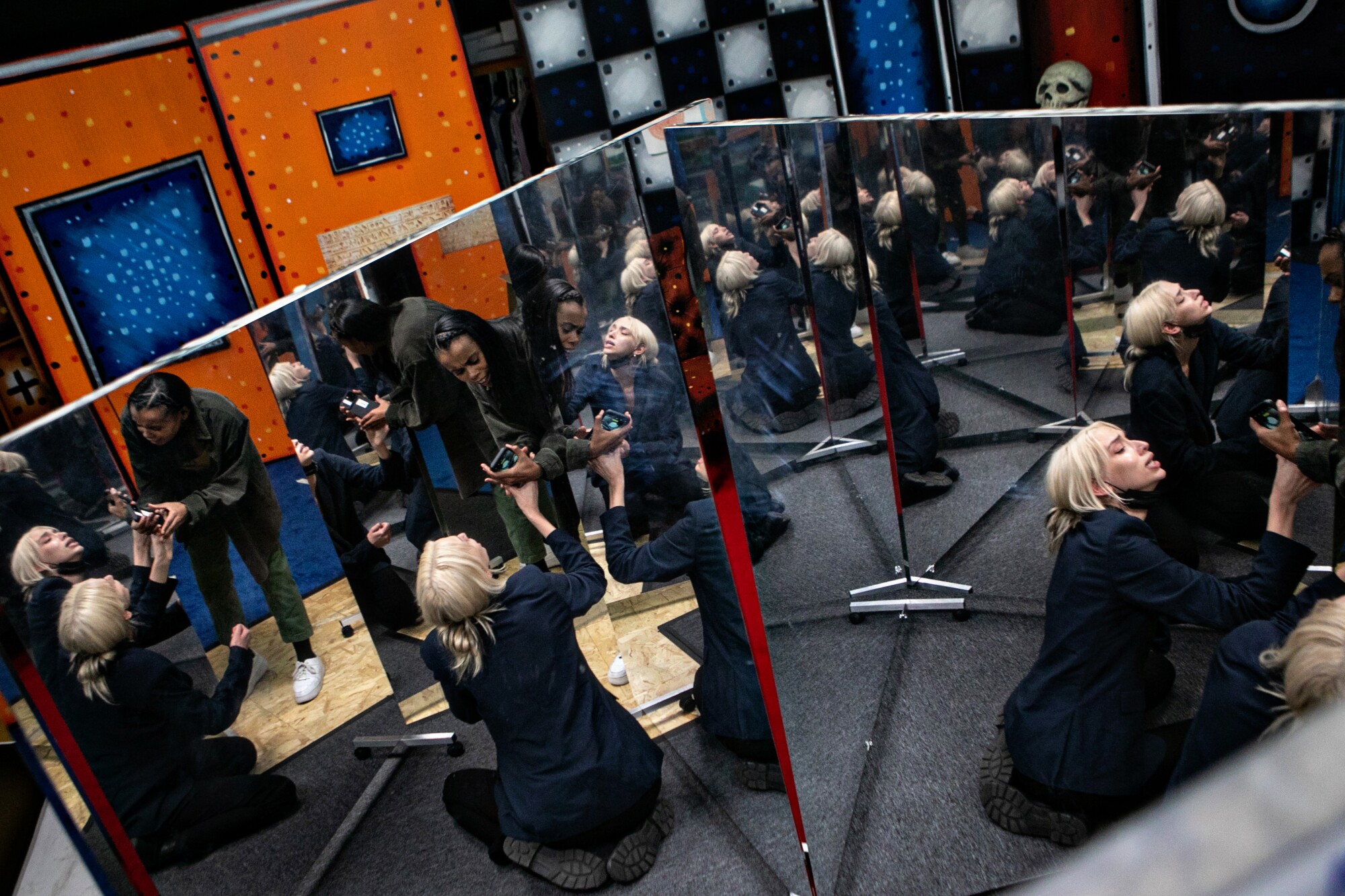
Sarah Coffey, seated, and Sydney Battle perform inside a room of mirrors during dress rehearsals of “Stapleview.”
(Jason Armond / Los Angeles Times)
Ultimately, it’s not clear that these live shows — and the week’s worth of work that goes into making each one — are really what’s driving interest in “Stapleview.” When it aired during the second episode, just under 400 people watched a sketch in which Wickline played an inept paleontologist; but the same sketch, re-posted to the @stapleview account a day later, has since racked up 1.3 million asynchronous views. Other pre-taped sketches posted online have gotten more than a million likes, making the show’s live audience look paltry by comparison.
The imbalance doesn’t seem to concern Grey, who calls the five-episode run “our pilot period.”
“This isn’t a hype house,” he said. “This is a quality over quantity situation. It’s not a numbers-based game. It’s really like: How do people fit together? How do we see this cast fitting together, and the writers coming together, to make something really special?”
His goal, he explained, is ultimately “to find an audience, and find a way to speak to them and make funny stuff” so the show can become self-sustaining. He’s not even tied to the live-streaming format; there’s a world, he said, where the show becomes entirely pre-taped.
Regardless of what the future holds for “Stapleview,” it may take some time for TikTok’s user base to catch up. As the second episode aired Thursday night, the comments section was full of viewers struggling to contextualize something so different from what they were used to seeing on the app.
“Is this really live?” one viewer asked.
“Def prerecorded,” another asserted, incorrectly.
“I can’t tell if this is sketch, improv or a fever dream,” someone quipped.
But others were quicker to catch on. All it took was for them to realize that what they were watching wasn’t so novel after all. In fact, the elevator pitch is quite simple.
As one commenter succinctly summarized the show: “It’s like SNL TikTok.”

